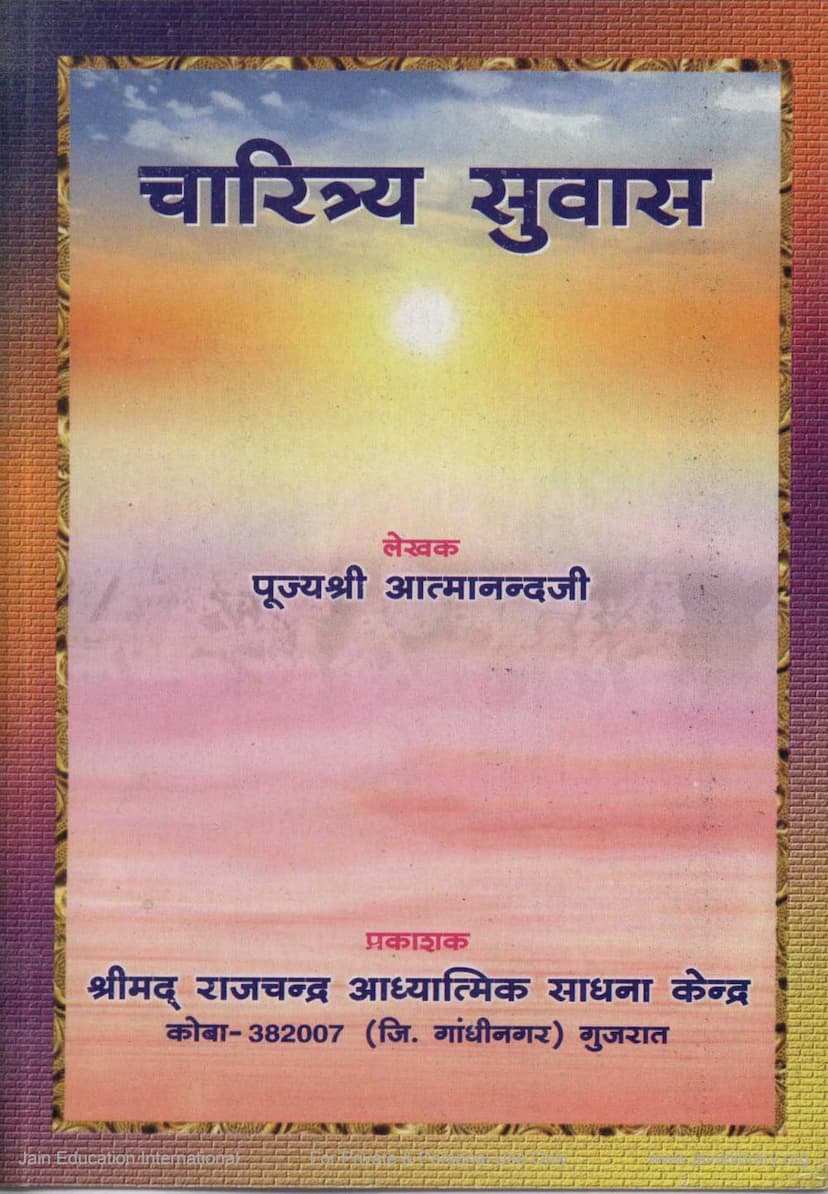Charitrya Suvas
Added to library: September 1, 2025

Summary
Here's a comprehensive summary of the Jain text "Charitrya Suvas" by Pujya Sant Shri Atmanandji, translated by Babulal Siddhsen Jain and published by Shrimad Rajchandra Sadhna Kendra Koba:
Overview:
"Charitrya Suvas" (Essence of Character) is a collection of inspiring anecdotes and life stories, originally written in Gujarati by Pujya Sant Shri Atmanandji and translated into Hindi by Babulal Siddhsen Jain. The book aims to provide moral and spiritual guidance by showcasing the exemplary conduct of great personalities from various walks of life and historical periods. The publisher, Shrimad Rajchandra Sadhna Kendra Koba, emphasizes that the book is intended to uplift individuals, particularly the youth, by drawing their attention to the noble examples of India's great men and women.
Core Philosophy and Purpose:
The central theme of "Charitrya Suvas" is the cultivation of good character through the study of inspiring life examples. The book addresses the fundamental question of how to embody virtues in one's life. It posits that by learning from the actions of great souls who have lived exemplary lives, individuals can gain motivation and inspiration to develop their own character. The book highlights India's rich spiritual tradition and expresses a regret that this tradition has not fully flourished after political independence, advocating for the creation and dissemination of character-building literature as a remedy.
Content and Style:
The book is structured as a collection of short, narrative-style stories, each illustrating a specific virtue or a valuable life lesson. The anecdotes are drawn from history, mythology, and the lives of saints, kings, scholars, artists, and ordinary people. The stories are presented in a simple, engaging, and relatable manner, making them accessible to readers of all ages and backgrounds.
Key Themes and Virtues Explored:
"Charitrya Suvas" covers a wide spectrum of human virtues and ethical principles, including:
- Ahimsa (Non-violence): The story of Lala Jambhuprasadji refusing his elephant for hunting, demonstrating unwavering commitment to non-violence.
- Honesty and Integrity: The tale of a merchant whose truthfulness and uprightness miraculously brought rain during a severe drought.
- Selflessness and Sacrifice: Examples of individuals sacrificing personal gain or comfort for the well-being of others or for higher principles.
- Humility and Modesty: Stories highlighting the importance of not being arrogant despite achievements or status.
- Courage and Steadfastness: The resilience of individuals in upholding their principles even in the face of adversity or threats.
- Justice and Fairness: The conduct of rulers and officials who prioritize justice and impartiality.
- Compassion and Empathy: The kindness shown towards the poor, the needy, and all living beings.
- Contentment and Detachment: The ability to be satisfied with what one has and not be overly attached to material possessions.
- Devotion and Spirituality: The deep faith and connection individuals have with the divine.
- Diligence and Perseverance: The importance of consistent effort in achieving goals.
- Forgiveness and Tolerance: The power of accepting mistakes and offering forgiveness.
- Respect for Elders and Gurus: The honor and deference shown to those who guide and teach.
- Purity of Conduct: Maintaining ethical standards in thoughts, words, and deeds.
Notable Anecdotes (Illustrative Examples):
The book features numerous compelling stories. Some notable ones include:
- "Ahimsa ka Pujari" (Worshipper of Non-violence): Lala Jambhuprasadji's refusal to let his elephant be used for hunting, even under pressure from the British Collector.
- "Pramanikta ka Pratap" (The Glory of Honesty): A merchant whose honest dealings were so pure that his invocation brought rain to a drought-stricken land.
- "Khuda ka Farishta" (Angel of God): The story of Shrimad Rajchandra (Raiichandbhai) tearing up a contract that would have brought him immense profit, prioritizing his word and the well-being of the other party.
- "Buddhiman ko Ishara Kafi" (A Hint is Enough for the Wise): The tale of a wise disciple who recognized the futility of worldly pursuits and chose a spiritual path.
- "Acharya Shuklapaksh" (The Story of Acharya Shuklapaksh): Highlighting the importance of proper conduct and the impact of genuine spiritual practice.
- "Kavika Sachcha Mulyankan" (True Evaluation of a Poet): Illustrating the king's appreciation for a poet's work by valuing it above material wealth.
- "Charitrya Suvas" (Essence of Character): The title story itself, emphasizing the fragrant impact of good character.
Target Audience and Impact:
"Charitrya Suvas" is intended for a broad audience, including children, youth, adults, thinkers, and spiritual seekers. The publisher believes that by engaging with these stories, readers will be inspired to cultivate virtues, lead more meaningful lives, and contribute positively to society and the nation. The book's second edition highlights the hope that the new generation will draw inspiration from these historical accounts to improve their personal, collective, and national lives.
Publisher's Commitment:
Shrimad Rajchandra Sadhna Kendra Koba, operating under the Shrimad Rajchandra Spiritual Sadhana Center, is dedicated to publishing useful literature that promotes life upliftment. The book is presented as a humble effort to guide readers towards a more virtuous and fulfilling existence.
In essence, "Charitrya Suvas" is a treasure trove of moral stories designed to instill positive values and inspire readers to build strong character, drawing upon the timeless wisdom and exemplary lives of great individuals.